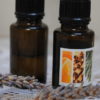We’ve been talking about metabolic syndrome recently and it’s a perfectly timed segue into February, often celebrated for love and everything related to hearts. (Check out the recent blogs to see the connection between heart health and metabolic syndrome.)
Let’s build on this idea of heart health, but with an added perspective. In addition to the expected advice … like eating well, exercising, getting sleep, etc. to support our mitochondria, heart, and overall health … we need to consider how our emotional “heart health” affects our physical heart health.
An eye-opening area of research that demonstrates this connection is the study into adverse childhood experiences (ACEs).
Just look at this title of the study: Adverse Childhood Experiences and the Risk of Coronary Heart Disease in Adulthood: Examining Potential Psychological, Biological, and Behavioral Mediators in the Whitehall II Cohort Study.
The education world has been using such research to intervene and help children with ACEs. “Trauma occurs when children are exposed to events or situations that overwhelm their ability to cope with what they have just experienced,” quoting from the Head Start.
When I look at the list of what educators and scientists consider an ACE (like physical abuse, emotional neglect, loss of a parent), it reads like an emotionally broken heart.
Similarly, I found that there is something called broken heart syndrome, which directly affects the physical heart. Mayo Clinic describes it as “a heart condition that’s often brought on by stressful situations and extreme emotions. The condition also can be triggered by a serious physical illness or surgery. Broken heart syndrome is often a temporary condition. But some people may continue to feel unwell after the heart is healed.”
Understanding What Affects Your Heart
While we can’t go back in time and erase early traumas, we can be aware of the potential effect on our bodies. We also can be cognizant of the powerful consequences of real-time stressors.
For example, if you know that diabetes or heart disease run in your family — and you’re considering your whole health, including childhood or current stressors — you can be more proactive about screenings and keeping an eye on your health. You can collaborate with your health care practitioners to schedule your annual blood work and needed heart screenings. And, another proactive take …
Connections Are Good for Your Heart?!
I like this practical and hopeful perspective from the article How Human Connection Affects Our Hearts and Hormones. “It’s becoming increasingly clear that our biological responses to the outside world are stronger than we once thought. And it’s not all negative: Hormones associated with love and social connections can light up our nervous system and give us a health boost. The results run deep in the body, down to the very rhythm of our hearts.”
We need intentional connections. Relationships are powerful, benefiting our bodies and minds.
I’ll leave you with this interesting TED Talk from Dr. Robert Waldinger on the long-running Study of Adult Development, which started in the 1930s and has followed participants and later their family members to consider numerous aspects of human health and development. Dr. Waldinger states in the video that, “Our study has shown that the people who faired the best were the people who leaned into relationships with family, with friends, with community.”
So, when you think about your personal and family history, if needed, find support from a doctor and/or counselor who will help you process previous experiences, and they can help you learn how these experiences and related habits are affecting your body now and how to make changes to support our minds, bodies, and hearts.



![z31[1]](https://simplywholebydevi.com/wp-content/uploads/2018/06/z311-100x100.jpg)












